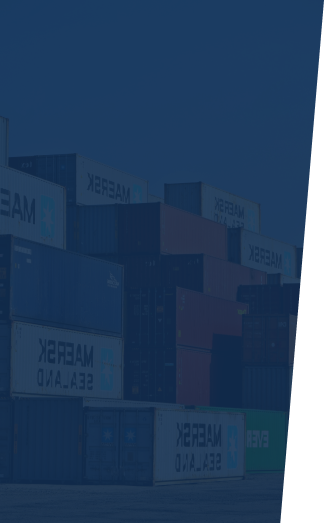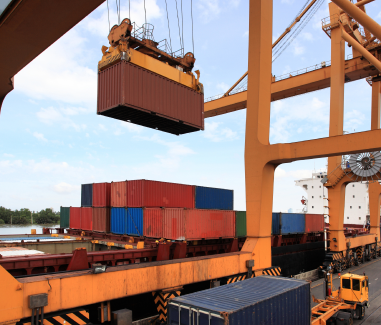Managing intermodal and multimodal transportation across the globe
Our intermodal and multimodal transportation solutions allow you to
 Optimize Routing
Optimize Routing Reduce Shipping Costs
Reduce Shipping Costs Deliver Goods on time
Deliver Goods on time Ensure Logistical Ease
Ensure Logistical Ease
Managing intermodal and multimodal transportation across the globe
 Optimize Routing
Optimize Routing Reduce Shipping Costs
Reduce Shipping Costs Deliver Goods on time
Deliver Goods on time Ensure Logistical Ease
Ensure Logistical Ease
Dealing with a single carrier vs leveraging the expertise of multiple carriers
The decision to involve one or more than one carrier when you send your cargo from the point of origin to its destination depends on different factors such as cost, convenience, time, efficiency in management, nature of goods, and so on. We deliver the right custom-built, scalable solutions based on our clients' needs.
We understand what the client’s goals are. We recommend the best solution based on what they need. As seasoned players in the industry, having dealt with a wide variety of hurdles across different modes, we are well-poised to help our clients preempt and avoid typical challenges that they may face.
Our years of expertise and understanding of the logistics industry help us provide you with:
Whether it's intermodal or multimodal transportation, as long as you’re working with us, we ensure that we have an eye on your shipment, which keeps it safe. No matter where your shipment is headed, we always have our eyes on the prize.

We custom-build our solutions to ensure that your goods reach the intended destination in the best possible manner so that your goods reach their destination on time.

We leave guesswork out of the equation. Our understanding of the market, regular follow-ups, and following through on our commitments, make it a stress-free experience for you.
We ensure that your experience with intermodal & multimodal transportation services is easy
Unforeseen challenges may sometimes disrupt the pace of your business. The interconnectedness of infrastructure systems is imperative to manage such disruptions, which is where intermodal and multimodal transportation come in.
Intermodal Transportation
When you use intermodal transportation to send your goods to their destination, each leg of the shipment is handled by a separate company. For example, if you need to send a shipment from one country to another, where both countries are on different continents, then you could have to contact a trucking company to move the shipment by road to a shipping port, loaded onto a cargo ship. When the ship sets sail and reaches a specific pre-determined port, it unloads the shipment and the shipment moves to a rail carrier. The shipment could then be sent by truck to its final destination, completing the journey. As a result of using intermodal transportation, each leg of that shipment is handled by a different company. This means that you need to have several contracts in place, one with each carrier to handle their specific leg of the shipment.

The advantages of intermodal transportation are:
Each transport leg benefits from flexibility and specialized handling of goods at different ports, allowing you to negotiate lower rates.
A reduction in carbon footprint can be brought about by way of choosing environmentally friendly carriers.
Intermodal transportation allows more access to equipment, control capacities, and select transit schedules.
Multimodal Transportation
Multimodal transportation is a combination of at least two or more different modes, such as air, sea, rail, or road, to move your cargo from one point to another with one company handling the shipment’s various legs. For example, if you have a shipment moving from Nagpur to Singapore. After the cargo is packed in containers in Nagpur, the carrier manages the journey of the shipment by road to Mumbai port. From Mumbai, the carrier begins its journey by sea to Singapore. The same carrier manages the journey from the port in Singapore to its final destination within Singapore via road.

The advantages of multimodal transportation are:
Since the same company manages the end-to-end shipment of goods, it can monitor and have visibility on the entire shipping process, delivering from door to door.
Having one company managing the entire multimodal transportation exercise ensures access to even remote parts of the world, with responsibility and liability assumed by one company.
Since multiple companies are not managing the shipment the way they would in the case of intermodal transportation, you save time and resources on coordinating across different companies, simply coordinating with one company instead.
Road & Rail Freight Forwarding
Road and rail freight forwarding ensure the seamless movement of goods across land - be it highways or railways. As service providers, our priority in today’s economy is to leverage this service to bridge the gap between demand and supply. BlueApple Logistic Solutions deploys road and rail freight forwarding services to move cargo via trucks and trains. This service crucially connects several industries, manufacturers, and consumers, ensuring the timely arrival of products and materials.

From tiny parcels to massive loads we deploy a fleet of trucks to move cargo. This service offers versatility in reaching even the most remote or challenging terrains in terms of destinations. We coordinate shipments, optimise routes for efficiency, and ensure cost-effectiveness.
We tap into the robust rail network to transport goods on an epic scale. This mode is ideal for moving bulk shipments, heavy machinery, and long-distance transport. We manage the logistical intricacies of rail cargo and oversee the loading, transit, and unloading.
Both these services go beyond mere transportation; like most other logistics services, there are a lot of details involved, from documentation management to regulatory compliance, tracking, and, where necessary, cargo consolidation. We also navigate the complexities of cross-border transportation, ensuring seamless customs clearance.
We are proud to be the providers of a service as crucial as freight forwarding, which brings industries together, connects producers to consumers, and more importantly, fuels commerce, bolsters economic growth, and fosters connectivity in a world that thrives on movement and delivery.
Request a free quote